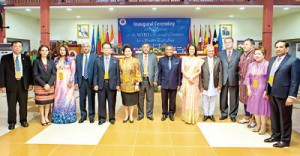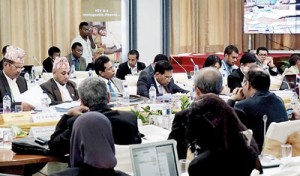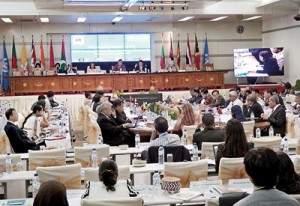News
Lanka plays prominent role with war on tobacco high on agenda
Sri Lanka played a prominent role when high-level health policy-makers of the South-East Asian Region (SEAR) met over five days of intensive consultations in Timor-Leste this week.

It's time for smiles and a photograph soon after the inauguration of the 68th meeting with Timor-Leste PM Dr. Rui Maria de Araujo (seventh from right) and WHO South-East Asia Regional Director Dr. Poonam Khetrapal Singh (sixth from right). Sri Lanka's Health Minister Dr. Rajitha Senaratne is on the extreme right.
The major outcomes of the deliberations spearheaded by the World Health Organisation (WHO) are the adoption of six resolutions on priority areas and the Dili Declaration pledging to continue the war against the tobacco epidemic gripping the region.
Through the six resolutions, the 11 countries of SEAR resolved to strengthen the cancer prevention and control programme; tobacco control; preparedness to respond to emergencies and outbreaks; action against anti-microbial resistance (AMR); community-based health services; and patient safety for sustainable Universal Health Coverage.
These areas of concern dominated the agenda of the 68th Regional Committee Meeting of WHO SEAR which kicked off in Dili, the capital of Timor-Leste, on September 7 and ended on September 11.
The Regional Committee is the governing body which sets the health agenda for the region annually and discussions also focused on prevention and control of cancer, expanding universal health coverage and elimination of neglected tropical diseases.
Timor-Leste Prime Minister Dr. Rui Maria de Araujo inaugurated the session at the Dili Convention Centre, a beautiful market with a Portuguese façade and a roof of woodwork – now converted into a large meeting hall.
The large WHO presence was headed by South-East Asia Regional Director Dr. Poonam Khetrapal Singh, while 10 of the 11 countries comprising this region were represented by their Health Ministers, with India sending a high-level bureaucrat in place of the Minister.
The 11 member-states of WHO SEAR are Sri Lanka, India, Bangladesh, Bhutan, Nepal, Maldives, Thailand, Myanmar, Democratic People’s Republic of Korea, Indonesia and Timor-Leste.
Sri Lanka’s powerful delegation comprised Health Minister Dr. Rajitha Senaratne; Advisor Dr. Sujatha Senaratne; Director-General (DG) of Health Services, Dr. Palitha Mahipala and Deputy DG (Planning) Dr. Neelamani Rajapaska Hewageegana.

Sri Lanka's Health Minister Dr. Rajitha Senaratne, making a point as the 'Lead Speaker' at the Ministerial Roundtable on 'Accelerating implementation of WHO FCTC in SEAR'. Next to him is the Director-General of Health Services, Dr. Palitha Mahipala. Pic by Nivell Rayda
All three important Ministerial Round-tables spread over the five days had Dr. Senaratne on the panel including as ‘Lead Speaker’ on ‘Accelerating the implementation of the WHO Framework Convention on Tobacco Control (FCTC)’ on September 7.
While he also spoke at the second round-table on September 8 on ‘Strengthening the health workforce in Southeast Asia in order to expand delivery of effective services’, the Minister moderated as well as spoke at the third round-table on September 9 on ‘Health in the post-2015 Development Agenda’.
It was at the third round-table that — in the light of the adoption of the post-2015 development agenda being on hand globally — SEAR discussed whether the issues faced by their countries are reflected in the United Nations Sustainable Development Goals (SDGs) which are built on the Millennium Development Goals (MDGs) and what challenges they would face in making progress on the SDGs for health. The SDGs are due to be adopted at the UN General Assembly sessions this month in New York.
Dr. Senaratne, as Health Minister, has also been honoured with the WHO Director-General’s ‘World No Tobacco Day Award’ for 2015.
Underscoring that Sri Lanka has done much to reduce tobacco use and made significant progress in implementing tobacco control policy, Minister Senaratne said that the National Authority on Tobacco and Alcohol Act was modelled on the FCTC.
Sri Lanka has comprehensive bans on advertising tobacco products and the declaration of smoke-free places is being implemented, while the Government is bringing in further amendments to the Act to tighten a few loopholes in the definition of enclosed places and certain aspects of indirect advertising.
Pointing out that “utmost political support and leadership for tobacco control” are being given by President Maithripala Sirisena, the Minister said that work has started on a revised tobacco tax structure.

Ministerial Roundtable on 'Accelerating implementation of WHO FCTC in SEAR'. Pic by Nivell Rayda
“One of the first actions after being elected President was a personal intervention to obtain Parliamentary approval for an urgent bill to increase the surface area of pictorial health warnings on cigarette packets from 60% to 80%.”
But, he lamented that even with the 80% pictorial warnings, the tobacco industry seems to be using one rather unclear picture depicting a baby more often than other pictures depicting adults with serious tobacco-caused illnesses.
“We urge the WHO to help us continue our work,” he said, appreciating the close links formed to build a tobacco-free Sri Lanka. It has not been an easy task to achieve this level of success, the Minister pointed out, adding that the challenges imposed by the tobacco industry interfering with public policies became apparent during the legal process to implement the pictorial warnings.
The other challenges include the informal promotions of tobacco to children using multiple entertainment channels which cannot merely be controlled through tobacco control laws and smokeless tobacco and non-cigarette products such as beedi which impose a considerable burden in Sri Lanka, according to Dr. Senaratne. “The tobacco industry uses this as an excuse to block tax increases on cigarettes.”
With regard to Electronic Nicotine Delivery Devices, the sale of which is not allowed in Sri Lanka in line with the WHO position, he expressed concern over their surreptitious introduction to the market.
| Lanka hosts next meeting of WHO South-East Asia region Sri Lanka will host the 69th Regional Committee Meeting of the WHO South-East Asia Region next year around the same time. |
Announcing that Sri Lanka is moving forward on the ratification of the Illicit Tobacco Protocol, which has got the nod from the Government, he said Sri Lanka is discussing with the WHO SEAR and the FCTC Secretariat to host a regional conference on illicit tobacco control.
At the inauguration of the session, it was WHO Regional Director Dr. Khetrapal Singh, who painted graphic images of the consequences of tobacco use in the region.
| Tea time with a difference The inauguration was over and it was time for coffee and tea. |
Tobacco kills 150 people every hour and 1.3 million people every year in SEAR, including people who have never used tobacco themselves, but are exposed to second hand and third hand tobacco effects.
With the region accounting for over 1/3rd of the world’s tobacco use, it is home to 25% (246 million) of the world’s smokers and 90% (290 million) of the world’s smokeless tobacco users. Worldwide, tobacco use kills nearly six million people annually with over 600,000 deaths due to exposure to second-hand smoke.
The use of different types of smokeless tobacco which could be chewed or sucked, snuffed orally or nasally, sipped or gargled or applied to teeth and gums, is also on the rise. Tobacco use has been identified as one of the major risk factors for serious diseases such as lung disease, heart disease and cancer and is the leading cause of preventable deaths.
Pointing out that the region is one of the largest producers and users of tobacco products in the world, Dr. Khetrapal Singh explained that the many types of smoking and smokeless tobacco products used in the region, pose difficulties in harmonizing taxation and regulations for controlling tobacco use.
Just before the unanimous adoption of the Dili Declaration, pledging to accelerate hard-hitting measures to reduce tobacco use, she added that as tobacco use in the region is alarmingly high, triggering major health and economic consequences, tougher actions are needed for tobacco control and prevention.
“Countries must equally tax all tobacco products, ban tobacco advertisements, enforce pictorial warnings on cigarette packs and implement a ban on public smoking. We need to enforce stringent policies and measures to help people reduce and eventually quit tobacco; to prevent the youth and children from taking to tobacco use; and to protect people from secondhand tobacco smoke,” she added.
The Dili Declaration calls on the governments, UN agencies and partners to accelerate tobacco control in WHO SEAR.
For, accelerating the implementation of the WHO FCTC is vital in achieving one of the post-2015 SDGs which aims to reduce tobacco use by 30% by 2025.
Timor-Leste’s Premier Dr. de Araujo, meanwhile, stressing “one for all and all for one” at the inauguration said: “This meeting presents opportunities for member-states to contribute towards the direction of the WHO at the regional level. You will set the health priorities as well as the health agenda for our region; a tremendous task that will affect the lives of millions of people.”
Coincidentally, Dr. de Araujo had been Health Minister when Timor-Leste became the 192nd member-state of the WHO in 2002. In Sri Lanka, it is former Health Minister Maithripala Sirisena who is now President.

